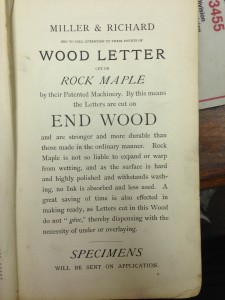Letterpress Printing in Czar’s Russia
 On this 4th of July, I thought I would share this reproduction of an article in the Miller & Richards 1907 Type Specimen Book from Edinburgh, Scotland. It certainly makes American letterpress printers appreciate our “Freedom of the Press”
On this 4th of July, I thought I would share this reproduction of an article in the Miller & Richards 1907 Type Specimen Book from Edinburgh, Scotland. It certainly makes American letterpress printers appreciate our “Freedom of the Press”
Printing in Russia
At a time when attention is constantly being directed to the land which bulks so large in the map of Europe, something concerning the conditions attendant on the exercise of the craft of printing amongst its people will be appropriate. An American contemporary states that from the moment a Russian subject petitions the Czar’s Government, through the Minister of the Interior, for a concession to conduct either a printing or publishing business, he is subject to the most galling regulations, restrictions and surveillance that the Muscovite mind is capable of conceiving. A most searching enquiry is made by the secret police in the antecedents of the applicant, and if found that the slightest suspicion was ever entertained as to the loyalty of any member of the family, this fact is held to be sufficient reason for a peremptory refusal of the concession, even though the life record of the applicant may have been beyond reproach from an official standpoint.
The policy of the Russian Government is restrictive in the extreme. Publicity and dissemination of progressive ideas are most strictly tabooed, and as a precaution, the Government exercises complete control over every printing office and type foundry throughout the empire, and neither of these establishments can be opened without first securing very special authorisation, which each year is becoming more and more difficult to obtain.
The Minister of the Interior, next to the Czar the most powerful official in Russia, has absolute sway in the matter of granting petitions, and he may render his decision when he sees fit, and it is no uncommon occurrence for the petition to find a final resting place in an obscure pigeon hole, the applicant having to await this official’s pleasure. An appeal would be worst than useless. Should the printer be so fortunate as to obtain the concession, the
EXCEEDINGLY HEAVY RESPONSIBILITIES
that accompany it and the resistive censorship that fetters his every action, and his helpless dependence upon a number of venal officials devoid of scruples of any kind, are sufficient to crush out much of the enterprise with which he may have originally been endowed.



